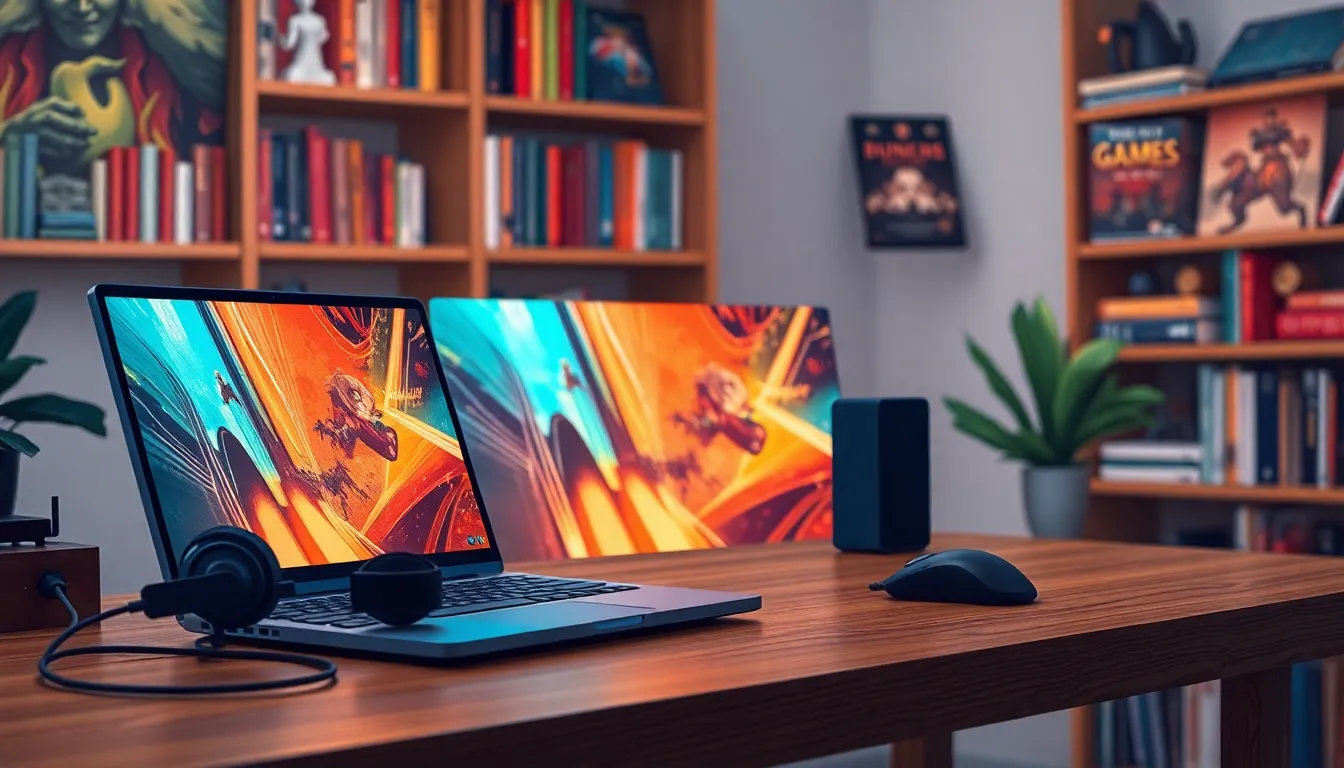In the fast-paced world of game development, having the right tools can make or break a project. Picture this: a laptop that can handle complex graphics, run demanding software, and still have enough battery life to survive those late-night coding marathons. It’s like finding a unicorn that can also brew your coffee—rare but totally worth the hunt.
Choosing the perfect laptop isn’t just about specs; it’s about unleashing creativity and keeping frustration at bay. After all, the last thing a developer wants is a machine that crashes during a critical moment, like the epic boss battle they’ve been coding for weeks. With the right laptop, developers can focus on what they do best—crafting immersive worlds and unforgettable experiences. So let’s dive into what makes a laptop not just good, but game-changing for aspiring and seasoned developers alike.
laptop for game development
Selecting the right laptop for game development significantly impacts productivity and creativity. Developers encounter intensive graphical requirements and software demands, making performance a top priority. Hardware specifications like a powerful CPU, substantial RAM, and a dedicated GPU facilitate seamless workflow while coding and testing games.
Quality visuals and smooth performance matter. A laptop that supports high refresh rates and superior graphics can enhance the game design experience. Long battery life plays a vital role as well, allowing developers to work uninterrupted during extended sessions without the need for constant charging.
Portability shouldn’t be overlooked. Game developers often work in various environments, so a lightweight design can ease transport between home and collaborative spaces. Display quality also influences user experience; a vibrant, high-resolution screen helps visualize intricate details in game graphics.
Reliability enhances focus. A dependable laptop minimizes crashes and software lag, allowing developers to concentrate solely on their creative processes. Additionally, an ergonomic design translates into comfort during long hours of coding or gamers’ playback.
Compatibility with various development tools plays a significant role in overall functionality. Many game development environments require specific hardware capabilities to perform optimally. Choosing a laptop with versatile connectivity options ensures smooth integration with peripherals, such as VR headsets and external storage devices.
Investment in the right laptop pays off. A well-chosen machine not only aids in game development but also fosters an engaging creative atmosphere, making the development process more enjoyable and productive overall.
Key Specifications To Look For

Selecting the right laptop for game development requires attention to specific technical specifications. Prioritizing these specifications ensures a smooth and productive development experience.
Processor
Powerful processors play a crucial role in game development. Intel Core i7 or AMD Ryzen 7 are optimal choices for robust multitasking. These processors handle complex calculations and demanding software efficiently. Additionally, faster clock speeds enhance overall performance, improving responsiveness during development. Keeping an eye on the number of cores can also help since more cores improve capabilities in tasks like rendering and compiling code. Choosing a laptop with a strong processor ultimately supports effective game design and reduces lag during intensive tasks.
Graphics Card
Dedicated graphics cards enhance the visual aspect of game development significantly. NVIDIA GeForce RTX or AMD Radeon RX series cards offer superior performance for rendering detailed graphics. With higher VRAM, they improve texture detail and allow for smoother animations. This capability becomes essential when testing and optimizing game performance. Compatibility with real-time ray tracing can also enhance graphic quality, making scenes more realistic. A strong graphics card not only uplifts the development environment but also enriches the gameplay experience.
RAM and Storage
Substantial RAM and fast storage options bolster game development productivity. A minimum of 16GB RAM is advisable for smooth multitasking and efficient management of large files. Upgrading to 32GB or more can significantly improve performance, especially in resource-heavy environments. Solid-State Drives (SSDs) provide faster data access speeds, reducing load times for software and games. Opting for NVMe SSDs allows for even better performance, benefiting those who handle extensive assets. A combination of ample RAM and speedy storage enhances overall workflow and minimizes frustration during long coding sessions.
Top Laptops For Game Development
Selecting the right laptop can transform the game development experience. Here are some notable options across different budget ranges.
Budget-Friendly Options
A few solid choices offer adequate performance without breaking the bank. The Acer Aspire 5 features an AMD Ryzen 5 processor, 8GB RAM, and a dedicated NVIDIA GeForce GTX 1650, making it suitable for entry-level game development. Additionally, the ASUS TUF Gaming A15 comes with an AMD Ryzen 7, 16GB RAM, and an NVIDIA GeForce GTX 1650 Ti, supporting mid-range graphics tasks efficiently. Cost-conscious developers can also consider the Dell G3 15, which provides Intel Core i5 power and decent graphics capabilities at a competitive price point.
Premium Choices
High-end laptops deliver exceptional performance for serious game developers. The Razer Blade 15 exemplifies this, incorporating an Intel Core i7, 32GB RAM, and NVIDIA GeForce RTX 3070, ensuring smooth rendering of complex graphics. Another premium option is the Apple MacBook Pro that features Apple’s M1 Pro chip and up to 64GB RAM, optimizing performance for intensive programming tasks. The MSI GS66 Stealth also deserves attention, with its robust Intel Core i9 processor paired with an NVIDIA GeForce RTX 3080, offering excellent power for heavy-duty game development work.
Additional Features To Consider
When selecting a laptop for game development, some additional features enhance the overall experience and productivity. Developers should take the following aspects into account.
Display Quality
Display quality plays a critical role in game development. A vibrant, high-resolution screen enables developers to visualize intricate graphics accurately. Several laptops offer 4K resolution, which provides more detail in visuals. Color accuracy is essential, as it affects the final game quality. An IPS panel can be beneficial for wider viewing angles, allowing for collaborative work when exchanging ideas. Furthermore, a higher refresh rate promotes smoother gameplay during testing phases, making it easier to spot potential issues in real-time.
Battery Life
Battery life significantly impacts work efficiency during development sessions. Developers often seek a laptop that can withstand extended periods away from power outlets. A laptop with a minimum of 8 hours of battery life can support long coding and testing sessions without interruptions. Those capable of lasting 10 hours or more excel, as they provide greater flexibility when working in various environments. Efficient power management helps reduce strain on the battery while maximizing productivity throughout the day.
Conclusion
Choosing the right laptop for game development is a pivotal decision that can shape a developer’s creative journey. A well-suited machine not only meets technical requirements but also enhances productivity and fosters inspiration. With the right specifications and features, developers can navigate complex projects more efficiently and enjoyably.
Investing in a laptop that balances power, portability, and display quality can significantly impact the overall development experience. As developers explore various options across budgets, prioritizing essential hardware will ensure they have the tools necessary to bring their creative visions to life. Ultimately, the right laptop can be a game-changer in the world of game development.



